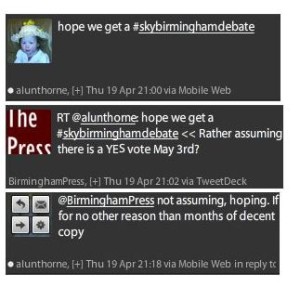Steve Beauchampé explores the ‘interests’ involved with the mayoral referendum.
A key argument in favour of directly elected mayors is that the incumbent will be ‘visible’ in a way that the current council leader is not. ‘How many people know who is the leader of Birmingham City Council?’ is the oft-repeated cry of the Yes lobby. I’d suggest anyone who takes even a passing interest in the city’s political life could answer that, especially as Mike Whitby has been the Leader for the last eight years and has probably made more local media appearances in that time than anyone else in Birmingham.
But being visible is not the same as being effective. Former Labour Leader Dick Knowles was both visible and effective; his successor, Theresa Stewart, largely eschewed publicity and concentrated on ensuring that the Council provided the ratepayers (as they were still known) with the services for which they had paid. Even as leader of Europe’s largest local authority, Stewart could often be seen queuing for a bus near the Bull Ring markets, shopping trolley in tow. It can be argued how effectively they did the job, but Knowles, Stewart and Mike Whitby, current Labour group leader Albert Bore too, were/are leaders of a team of councillors who shared responsibility for running the city, and thus their personal profile was/is of less relevance and importance than that of a mayor’s would be in a system where one figure will dominate.
It is no coincidence that the mayoral concept being offered to Birmingham’s electorate next week has its British roots in New Labour (who learned it, as they learned much else, from the United States) before it was taken up by that arch Tory moderniser, David Cameron (seen by many traditional Conservatives as Blair-lite). Both Tony Blair and Cameron conduct their political campaigns in a fog of spin and slick PR and, in elected mayors, have created a political rôle in their own image, laden with phoney glitz, bereft of substance. That it is three faded New Labour politicians – Liam Byrne, Siôn Simon and Gisela Stewart – who most covet the job of Birmingham mayor, says it all really.
In such a world a mayor has to be high profile, it’s almost the point of the job, one step removed from ‘famous for being famous’. Many local journalists appear entranced by the prospect of a Birmingham version of the Boris and Ken show, currently playing to full media entourages in London. They have a vested interest in the creation of an office that will bring the illusory glitter of celebrity stardust to their otherwise humdrum, low profile working lives.
 Witness, for example, Birmingham Post Editor Alun Thorne, who admitted hoping for a Yes vote: “If for no other reason than months of decent copy”. Meanwhile, a BBC WM presenter recently proclaimed himself “bored” by the mayoral issue, but would engage with it again if there were a Yes vote (and thus a cast of characters to revel in!). Even prior to the referendum, many local journalists are concentrating on who may or may not run, rather than whether the proposed change would be beneficial or detrimental for the city.
Witness, for example, Birmingham Post Editor Alun Thorne, who admitted hoping for a Yes vote: “If for no other reason than months of decent copy”. Meanwhile, a BBC WM presenter recently proclaimed himself “bored” by the mayoral issue, but would engage with it again if there were a Yes vote (and thus a cast of characters to revel in!). Even prior to the referendum, many local journalists are concentrating on who may or may not run, rather than whether the proposed change would be beneficial or detrimental for the city.
In an environment where both media and politicians are essentially reliant upon each other, the prospect of there being challenging, incisive coverage of mayoral politics, should Birmingham vote Yes, appears almost nil. Nonetheless, the suggestion on the latest embarrassing John Hemming/Roger Godsiff produced ‘No’ leaflet, that a mayor could head off to the beach and run the city in absentia, is absurd. The cosy mayoral/media axis will ensure that he/she won’t be out of the spotlight, and nor indeed would they wish to be. Any new council initiative, any big event, any high profile visitor, any business investment – indeed anything that puts Birmingham in the spotlight, the Mayor will be there, a walking, talking, smiling photo opportunity coming to your community, school, college, factory etc sometime in the period between mayoral elections.
As they will when something bad happens: a tragedy, a major crime, urban unrest, the death of a popular figure… the mayor will speak for us all, accompanied by the Police Commissioner (don’t forget, we’re getting one of those in November), political allies and a raft of concerned looking community leaders and other individuals drafted in to help the mayor strike the right tone.
In their desperation to be seen to be doing ‘something’, elected mayors will often grandstand and engage in gesture politics; lazy sound bites that proffer simplistic, populist responses and solutions to complex issues. And sooner or later, all sane people will hanker for the humility of a Theresa Stewart and her shopping trolley.



